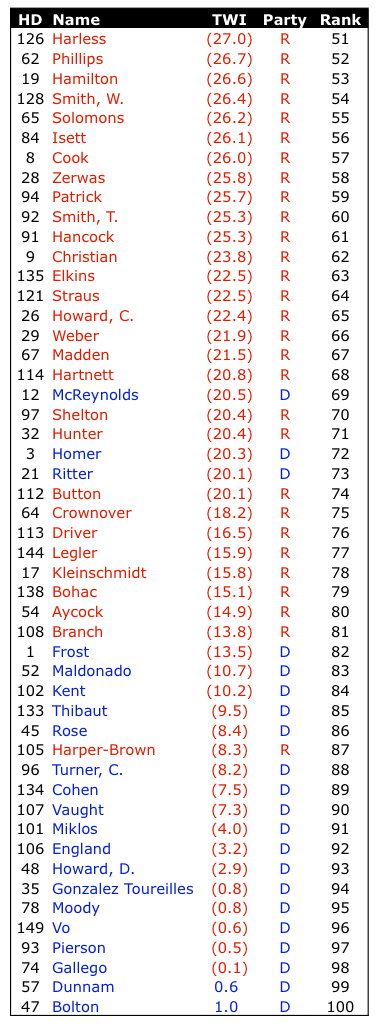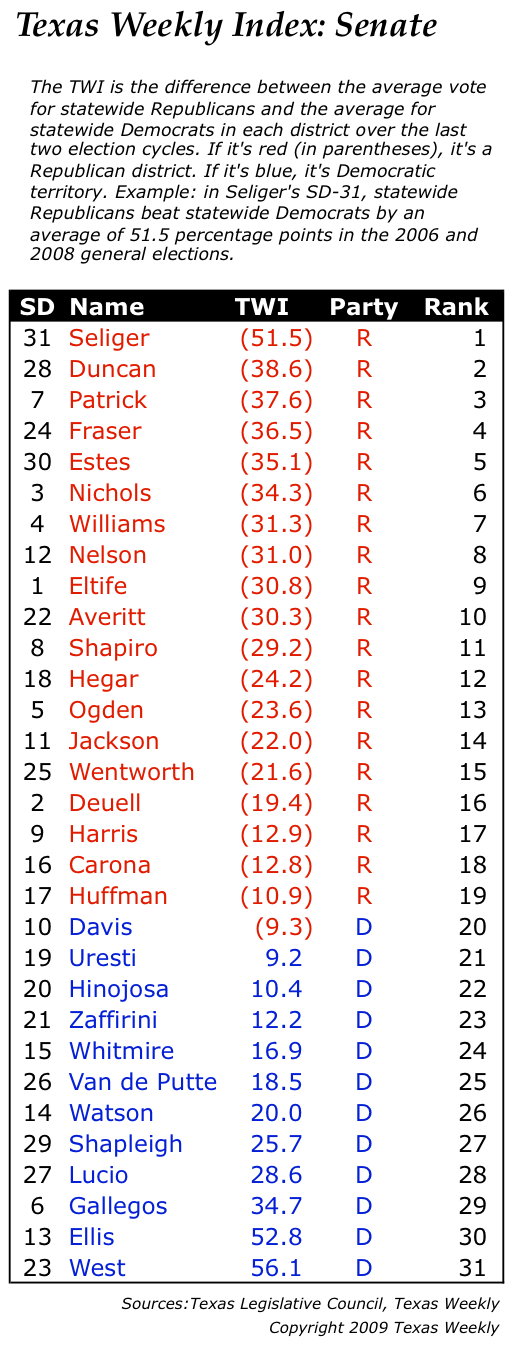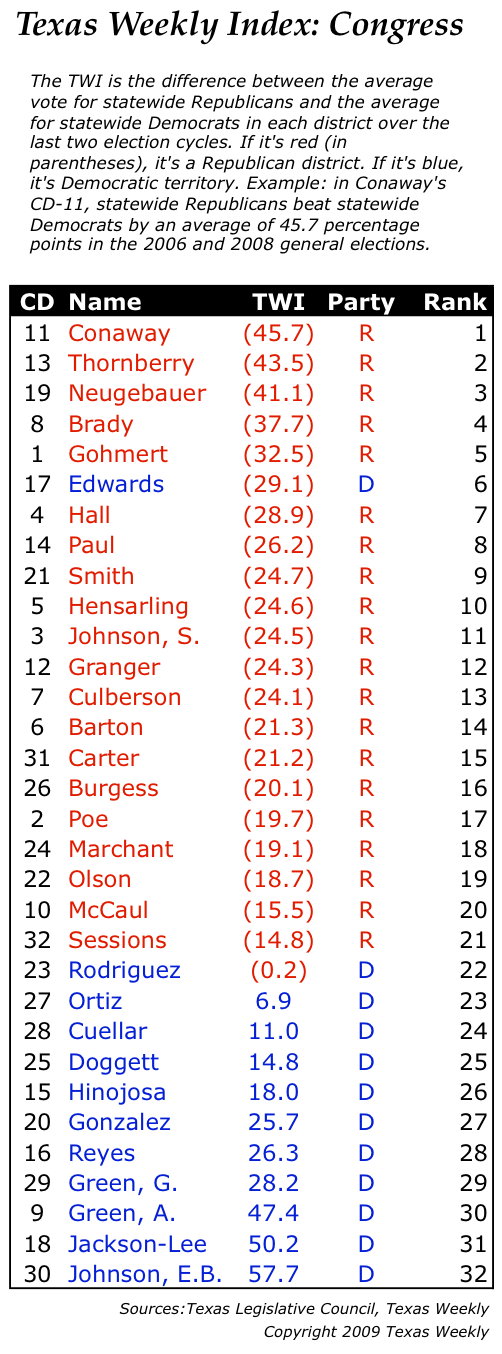We're entering the last days available to the governor to consider bills. Anything not vetoed by midnight on Father's Day will become law, with or without Rick Perry's signature.
Political fundraising season begins in full force next week, and it'll be fast and furious until July 1 — the deadline for the current reporting period. Incumbents want to show impressive totals when their numbers become public July 15 — the better to keep challengers away. Some candidates should be ahead of the opposition; U.S. Sen. Kay Bailey Hutchison, for instance, is a federal official and could raise money for a governor's race while Perry was frozen out by the law barring state officials from raising money while the Legislature is in town.
And when the fund drive is over, it'll be about time for a special session.
Leading up to the sign or veto deadline, Perry signed several "headline" bills from the session:
• Increasing the deduction on the state franchise tax to $1 million, freeing around 39,000 taxpayers from that tax at a cost to the state of about $172 million.
• Increasing the tax on smokeless tobacco, with the money being used to pay for that business tax cut, in part, and in part to repay student loans of doctors who agree to practice for a period of time in underserved communities in Texas.
• Setting up a system so that the state's second-tier universities can compete to become Tier 1 schools on a par with the University of Texas, Texas A&M and Rice. That same bill has tuition revenue bonds to rebuild university properties lost to Hurricane Ike.
• Perry is scheduled to sign reforms of the Texas Windstorm Insurance Association in Galveston. Back before the session went off track, that was the only piece of legislation he had pointed to as special session material. And the threat worked: Lawmakers got after the legislation right away.
Order, Please
The rumor mill still has the Guv calling a special in the early days of July and the probable list of issues hasn't changed: sunset dates, road bonds, public-private partnerships for roads, a revolving fund for roads, and getouttatownfast.
Keep an eye on the schedule of items that'll be left for the Sunset Advisory Commission to do in 2011 and what will be postponed until 2013. The commission staff and some lawmakers don't think sunset could handle what's already on their plate plus transportation, insurance, racing and two other agencies that didn't get done this year. And it's not as simple as moving any agency back two years. There's a squeak or a squawk for every delay, and Perry and Co. have to find the right combination to manage the workload, keep enough people politically happy, and prevent the scheduling issues from wrecking plans for a short special session.
But advocates for things that died at the end of the regular session want some attention for their issues, and they're clamoring. We're not rating the probabilities that you'll see any of this stuff, but from that line of supplicants come these requests:
• Agriculture Commissioner Todd Staples, The Texas and Southwestern Cattle Raisers and the Texas Farm Bureau want more than the constitutional amendment limiting eminent domain, which is already destined for the November ballot. They want to add provisions that compensate landowners when a government condemnation affects the value of the remaining property, and that allow landowners to buy back condemned property the government doesn't use.
• Add expansion of the Children's Health Insurance Program (which expansion the governor has said he doesn't support). That bill passed in one form or another in both the House and Senate but didn't make it out of the Pink Building. The expansion would allow families making up to 300 percent of the federal poverty level to qualify for CHIP so long as they pay premiums for those benefits.
• Put Voter ID on the agenda so that photo identification will be required of anyone who wants to cast a ballot in the 2010 elections. That was the most partisan issue of the session and one reason it started and ended badly.
Land Grab
At the Alamo with his right arm in a sling, Gov. Rick Perry signed a constitutional amendment that would put some limits on government eminent domain into the state constitution.
Governors sign bills into law, but Perry's signature on the constitutional amendment is purely symbolic. Amendments approved by the House and Senate go straight to voters without a required stop in the Guv's office, and this one will be on the ballot in November.
This isn't a first. Four years ago, the governor went to Fort Worth to sign a constitutional amendment defining marriage as "the union of one man and one woman." Both signings came after a legislative session and a few months before the governor planned to seek reelection from voters.
The eminent domain amendment would prevent governments from using their powers to force land sales and to then give the land to private developers. Voters will see this: "The constitutional amendment to prohibit the taking, damaging, or destroying of private property for public use unless the action is for the ownership, use, and enjoyment of the property by the State, a political subdivision of the State, the public at large, or entities granted the power of eminent domain under law or for the elimination of urban blight on a particular parcel of property, but not for certain economic development or enhancement of tax revenue purposes, and to limit the legislature's authority to grant the power of eminent domain to an entity."
Perry vetoed an eminent domain bill two years ago — one of 49 he shot down. He said it would have required governments to pay for economic damage to property they didn't acquire if the damage was a result of the acquisition itself. Some of his fellow conservatives — and some groups like the Texas Farm Bureau — didn't like that a bit. And in fact, the Texas and Southwestern Cattle Raisers Association and the Farm Bureau want Perry to add eminent domain to the summer special session he's promised. They contend the constitutional amendment doesn't go far enough.
The Texas Weekly Index
Most of the swing districts in the Texas House are held by Democrats, meaning they're more likely to be defending battleground seats than trying to wrest them away from the other party. We've got a peek at the political climate in each district, based on statewide results in the last two election cycles.
• In the Texas House, several Democrats hold seats in territories where voters are much friendlier to Republicans in statewide elections. The so-called WD-40s — White Democrats Over 40 years old — have been and remain on GOP target lists. Rep. Chuck Hopson, D-Jacksonville, is an example. He's in a district where the average Republican beats the average Democrat on the statewide ballot by more than 33 points. David Farabee of Wichita Falls and Joe Heflin of Crosbyton represent districts with similar numbers.
Republicans will have their sights on a couple of freshmen members next year, hoping that Kristi Thibaut of Houston and Diana Maldonado of Round Rock got in only because of the groundswell for Barack Obama in their districts in 2008, and might suffer in his mid-term elections in 2010. Democrats will focus on a freshman or two — Ken Legler is often mentioned — and on two veterans in districts that don't behave like they used to (the districts, that is): Linda Harper-Brown of Irving and Dwayne Bohac of Houston.
• By comparison, the Senate is a boring place if you're looking for competitive elections. Only one senator — Wendy Davis, D-Fort Worth — holds a Texas Senate seat where the other party dominates in statewide elections. There just aren't many opportunities for either party to gain ground (or lose it) in the upper chamber.
• Congress is a little more competitive than the Senate, but not much more. With the glaring exception of the Democratic congressman from Waco, most everyone in the state's congressional delegation is from a district that votes in congressional elections just like it does in statewide elections. U.S. Rep. Chet Edwards, a popular Democrat in a very Republican district, is the blueberry in the tomato soup — a blue dot in a red zone. Ciro Rodriguez, D-San Antonio, occupies a true swing district. By the numbers, it's about evenly split between the two parties.
Click on the graphics to download a printable version.
It Ain't So
Elizabeth Ames Jones "is staying in the U.S. Senate race until the last vote is counted," her spokeswoman says, trying to spike Internet rumors that the Republican will drop out.
Alicia Collins says the rumors have been dinging around the Internet and around the lobby, but there's nothing to it.
Jones, a Texas Railroad Commissioner, is one of several Republicans hoping to win Kay Bailey Hutchison's spot in the Senate after Hutchison leaves. Last week, Jones announced endorsements from former Gov. and First Lady Bill and Rita Clements.
Audio: Sharp Stump
U.S. Senate candidate John Sharp talked to a group of Austin Democrats at Scholz Garten.
Sharp was introduced by at a Texans for Obama gathering by Fort Bend County Commissioner Richard Morrison, who unsuccessfully challenged then-U.S. Majority Leader Tom DeLay in 2004.
Morrison's introduction.
Sharp's talk.
Sharp answers audience questions (caveat: it's hard to make out some of the questions).
The other prominent Democrat in the race, Houston Mayor Bill White, spoke to the same group last month.
Political People and Their Moves
Elsa Murano quit as president of Texas A&M University in College Station under considerable pressure from Chancellor Mike McKinney, and agreed to a severance package that will return her to her tenured professorship after a paid year off, and pay her $295,000 not to sue the school. That, after a very public back-and-forth that included the release of McKinney's harsh evaluation of her work and her harsh rebuttal. She was the first woman and the first Hispanic to head the state's second-largest state university.
R. Bowen Loftin, the chief exec at Texas A&M-Galveston and an engineering professor, will take over as interim president of the main campus in College Station while the regents search for a permanent replacement for Murano.
State District Judge Bill Moody of El Paso might run a third time for the Texas Supreme Court. He got more votes than any other Democrat on the statewide ballot in 2006 but lost to Republican Don Willett. Moody told the El Paso Times he's probably going to run, but didn't say for which seat. Three justices — Scott Brister, Paul Green, and Harriet O'Neill — are up for reelection next year to the nine-member court.
Former Gov. Bill Clements gave $100 million to the UT Southwestern Medical Center in Dallas, to be delivered over four years. "... my single goal is to help encourage and advance scientific discovery and innovation, prepare the next generation of physicians for Texas and the nation, and ensure the delivery of world-class medical care, which I believe uniquely happens at this academic medical center, already recognized as one of the top institutions in this country," he said.
The 62,000-member Texas Federation of Teachers reelected Linda Bridges and John O'Sullivan as president and secretary-treasurer, respectively. Those are two-year terms.
Quotes of the Week
Gov. Rick Perry, on the resignation of Texas A&M University President Elsa Murano after 17 months in that job: "Presidents and chancellors come and go. Some stay longer than others."
Dallas executive and former A&M Regent Erle Nye, in The Dallas Morning News: "I'm disappointed with the controversy. I wish that we could handle our governance better."
Mayor Vincent Francia of Cave Creek, Arizona, quoted in The New York Times after two candidates settled an election tie by cutting cards to determine the winner: “Originally we thought of settling this with a paintball fight but that involves skill, and skill is not allowed in this."
Rep. Vicki Truitt, R-Keller, quoted in the Fort Worth Business Press on the death of legislation that would have allowed local option gasoline taxes to pay for roads: "Conservatives said 'Tax bill! Tax bill!' That's rhetoric. Rhetoric doesn't solve problems. Legislators are supposed to solve problems."
Adam Kliebert, telling the Houston Chronicle he caught his next door neighbor — state District Judge Woody Densen — on camera putting $3,000 in scratches on his car: "I could understand if it was the neighborhood kid — some punk kid that lives around here — but a judge? I knew who did it — I just didn’t have proof."
U.S. Sen. Kay Bailey Hutchison in The Dallas Morning News, saying she supported Ronald Reagan for president after Gerald Ford, who had appointed her to the National Transportation Safety Board, wasn't competing with him, and comparing herself to Gov. Rick Perry (without saying his name): "And I've never supported a Democrat for president after I was involved in politics — unlike others who are running for public office. I never ran as a Democrat, either."
Rep. Leo Berman, R-Tyler, telling the Fort Worth Star-Telegram he won't challenge Rick Perry if the governor will adopt a quartet of his positions on immigration and states' rights: "He's going to let me know, and if he can agree with the four issues and if he can actually accept them as his own, then I'll step out of the race and endorse him for re-election as governor."
Texas Weekly: Volume 26, Issue 24, 22 June 2009. Ross Ramsey, Editor. Copyright 2009 by Printing Production Systems, Inc. All Rights Reserved. Reproduction in whole or in part without written permission from the publisher is prohibited. One-year online subscription: $250. For information about your subscription, call (512) 302-5703 or email biz@texasweekly.com. For news, email ramsey@texasweekly.com, or call (512) 288-6598.







